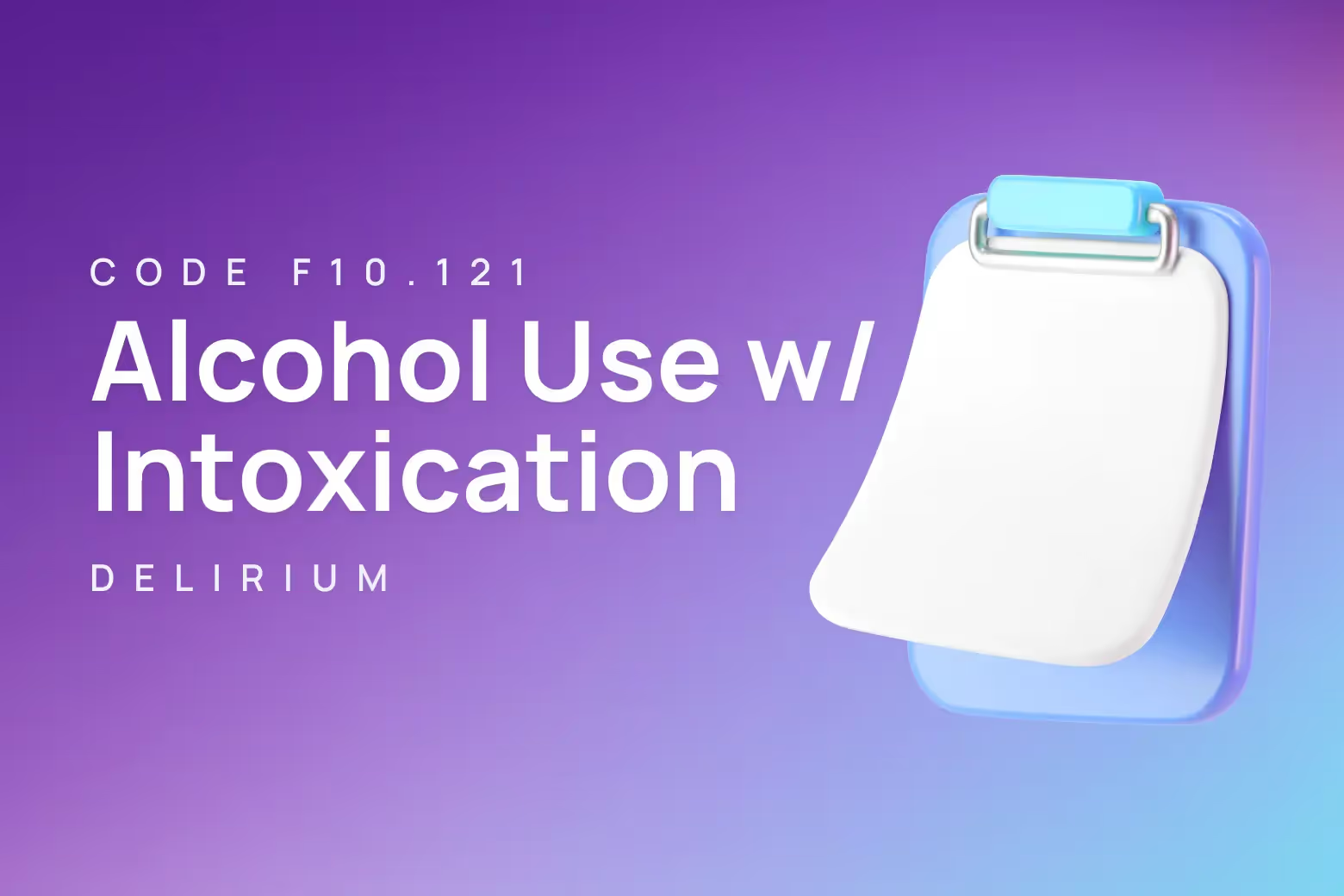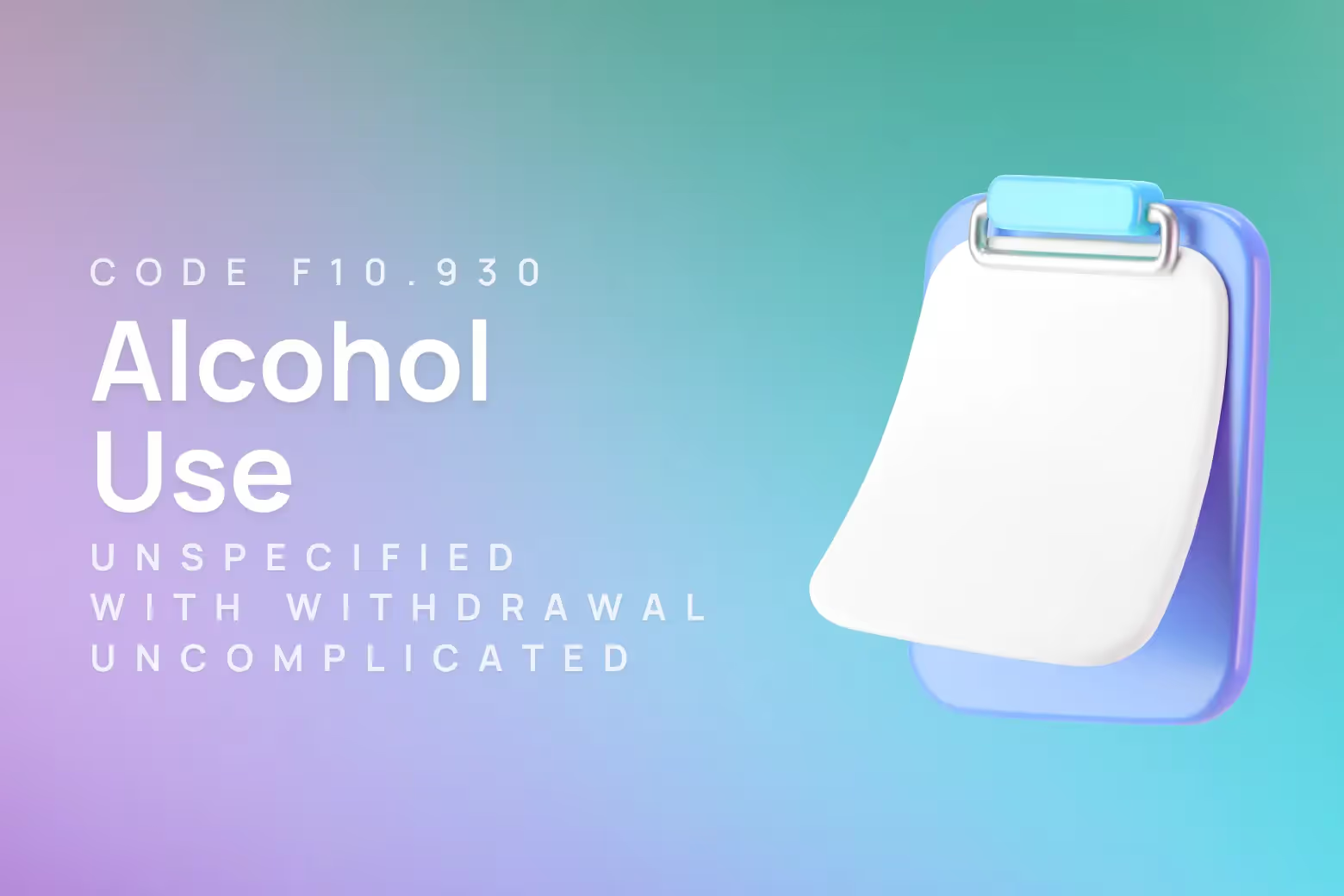ICD-10 code for alcohol abuse with intoxication, delirium

F10.121 is the ICD-10 code for alcohol abuse with intoxication, delirium.
This code represents a serious clinical presentation where individuals with patterns of problematic alcohol use develop delirium during an episode of intoxication.
Accurate diagnosis of this condition is critical for appropriate medical intervention and client safety.
Key features:
- F10.121 ICD-10 code combines alcohol abuse pattern with acute intoxication and superimposed delirium
- Requires immediate medical attention due to potential life-threatening complications
- Distinguished from other alcohol-related codes by presence of delirium during intoxication
- Often associated with severe autonomic instability and cognitive impairment

Diagnostic criteria for alcohol abuse with intoxication, delirium (F10.121)
Clinicians must establish both the underlying alcohol abuse pattern and the acute presentation of intoxication with delirium.
The alcohol abuse component requires a problematic pattern of alcohol use leading to clinically significant impairment, manifested by at least two symptoms within a 12-month period.
These symptoms include:
- consuming alcohol in larger amounts than intended
- persistent desire to reduce use
- spending considerable time obtaining or using alcohol
- craving
- failure to fulfill major role obligations
- continued use despite social problems
- giving up important activities
- using in hazardous situations
- continuing use despite physical or psychological problems
- tolerance
- withdrawal symptoms
The intoxication component involves recent alcohol ingestion leading to clinically significant maladaptive behavioral or psychological changes.
Delirium represents the most serious complication, characterized by disturbance in attention and awareness that develops over a short timeframe and fluctuates throughout the day.
Delirium criteria include reduced ability to direct, focus, sustain, and shift attention, along with decreased environmental orientation.
The disturbance develops rapidly, typically within hours to days, representing a change from baseline functioning with fluctuating severity.
Additional cognitive disturbances affect memory, orientation, language, visuospatial ability, or perception.
When to use F10.121 diagnosis code
The F10.121 code applies specifically when all three components are present simultaneously:
- underlying alcohol abuse pattern
- current intoxication
- delirium.
This represents a medical emergency requiring immediate hospitalization and intensive monitoring.
F10.121 vs F10.120 (Alcohol abuse with intoxication, uncomplicated)
F10.120 is used when someone with alcohol abuse presents with intoxication but without delirium or other complications.
The key difference lies in the absence of cognitive disturbance and altered consciousness.
Clients with F10.120 maintain clear awareness and orientation despite being intoxicated.
F10.121 vs F10.129 (Alcohol abuse with intoxication, unspecified)
F10.129 serves as a default code when alcohol abuse occurs with intoxication, but the specific complications or severity cannot be determined from available documentation.
This code should not be used when delirium is clearly identified, as the specific F10.121 code provides more precise diagnostic information.
F10.121 vs F10.221 (Alcohol dependence with intoxication, delirium)
F10.221 represents a more severe underlying condition where the client meets criteria for alcohol dependence rather than abuse.
Dependence involves more symptoms and typically indicates a more chronic, severe pattern of problematic use.
The intoxication with delirium presentation may appear similar, but the underlying diagnosis differs significantly.
Related ICD-10 codes
- F10.12 - Alcohol abuse with intoxication
- F10.120 - Alcohol abuse with intoxication, uncomplicated
- F10.129 - Alcohol abuse with intoxication, unspecified
Interventions and CPT codes for alcohol abuse with intoxication, delirium
Emergency medical stabilization
F10.121 presentations require immediate medical intervention to manage delirium and prevent complications.
Initial stabilization focuses on controlling agitation, correcting dehydration and electrolyte imbalances, and providing nutritional support, particularly thiamine supplementation to prevent Wernicke's encephalopathy.
Benzodiazepines serve as the primary medication for managing alcohol withdrawal delirium, with diazepam being the preferred choice due to its rapid onset and long duration of action.
Doses must be individually titrated, often requiring high amounts exceeding 100mg diazepam equivalent. The goal involves achieving light sedation where patients remain easily aroused.
→ CPT Code 90791 - Psychiatric diagnostic evaluation for comprehensive assessment and diagnosis establishment.
Inpatient monitoring and treatment
Clients with F10.121 require close monitoring, preferably one-to-one supervision, to ensure safety from wandering, falls, and self-harm.
Environmental management includes quiet rooms with minimal sensory stimulation, good lighting, and orientation cues like clocks and calendars.
Antipsychotic medications may be used as adjunct treatment for severe agitation, but never in isolation without adequate benzodiazepine coverage. Common options include haloperidol 2.5-10mg, olanzapine 5-10mg, or risperidone 1-5mg, with dosing repeated as needed.
→ CPT Code 99221-99223 - Initial hospital care for evaluation and management.
Substance abuse treatment planning
Once medically stabilized, clients benefit from comprehensive substance abuse treatment planning.
This includes motivational interviewing, cognitive-behavioral therapy for substance use disorders, and relapse prevention strategies.
→ CPT Code 90832/90834/90837 - Individual psychotherapy sessions (30/45/60 minutes) for ongoing alcohol abuse treatment.
Family involvement often proves crucial for recovery, addressing codependency issues and developing family-based relapse prevention plans.
→ CPT Code 90846/90847 - Family psychotherapy without/with patient present for addressing family dynamics.
Group therapy provides peer support and skills development for maintaining sobriety.
→ CPT Code 90853 - Group psychotherapy for peer support and skills development.
How Upheal improves F10.121 ICD-10 documentation
Suggesting appropriate ICD-10 codes based on session content
Upheal's clinical documentation platform analyzes session content to identify key diagnostic indicators for alcohol-related disorders.
The system recognizes patterns of alcohol abuse symptoms, intoxication presentations, and delirium characteristics to suggest F10.121 when appropriate.
This helps clinicians avoid coding errors that could delay appropriate care or create billing complications.
Maintaining HIPAA-compliant records with proper diagnostic coding
Documentation for F10.121 cases requires careful attention to medical complexity and safety concerns.
Upheal maintains secure, encrypted records that properly document the severity of presentation, medical interventions required, and ongoing safety monitoring.
The platform ensures all documentation meets HIPAA standards while supporting the complex care coordination needed for these critical cases.
Reducing administrative burden so you can focus on client care
Managing clients with alcohol abuse and delirium involves extensive documentation requirements, insurance authorizations, and care coordination.
Upheal automates routine documentation tasks, generates compliant progress notes, and tracks treatment plans, allowing clinicians to focus on the intensive clinical care these clients require during medical stabilization and early recovery.
Supporting clients with alcohol abuse with intoxication, delirium
Clients presenting with F10.121 face immediate medical risks requiring urgent intervention.
The combination of alcohol abuse, intoxication, and delirium creates a complex clinical picture that demands both medical stabilization and longer-term substance abuse treatment planning.
The acute phase involves managing delirium symptoms while preventing complications like seizures, cardiovascular instability, and injury from confusion or agitation.
Environmental modifications, medication management, and intensive monitoring form the cornerstone of immediate care.
Recovery planning must address both the underlying alcohol abuse pattern and any medical complications that arose during the acute episode.
Clients often require extended treatment involving detoxification, rehabilitation, and ongoing substance abuse counseling.
Family involvement and social support systems play crucial roles in successful long-term recovery outcomes.
Upheal's clinical documentation platform supports clinicians throughout this complex treatment process, from emergency stabilization through long-term recovery planning.
By automating documentation tasks and suggesting appropriate diagnostic codes, Upheal helps ensure clients receive comprehensive, well-documented care that supports both immediate safety and lasting recovery.
Start your free trial today to experience how Upheal can improve your alcohol-related disorder documentation and client care.













